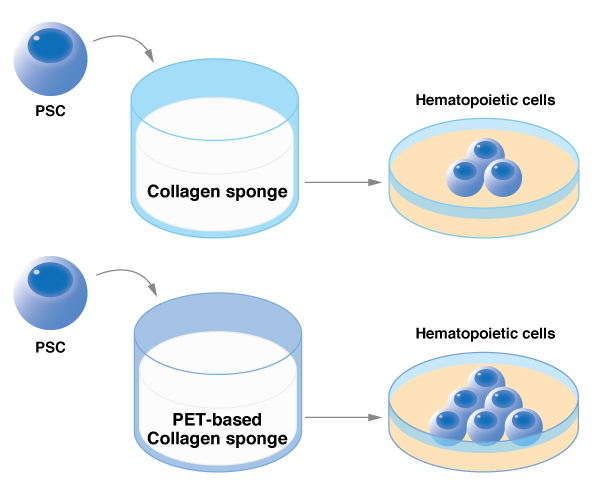
Research Activities
Research Activities
Publications
September 26, 2016
New biomaterial enhances the number of differentiated hematopoietic cells from stem cells

Because of their stability, which allows longer culture times, PET-based collagen sponges significantly increase the number of hematopoietic cells produced from pluripotent stem cells.
using innovative biomaterial that allows for longer culture times.
The creation of blood in the lab for clinical purposes depends on collaboration between not only cell biologists, but also materials scientists. Sometimes these collaborations can occur without the two parties even realizing it. That happened with Dr. Yoshinori Sugimine and Dr. Akira Niwa at the Megumu Saito lab in CiRA, who had been looking for biomaterials specific for the culturing of blood cells. "We found an appropriate collagen sponge and learned it was from Dr. Tabata," Niwa said, referring to Professor Yasuhiko Tabata, an expert on biomaterials at Kyoto University. The Saito lab was well familiar with Tabata's work and contacted him about a joint project using his collagen sponges for the preparation of blood cells from pluripotent stem cells.
Collagen sponges are commonly used to transition from 2D cultures to 3D cultures for cell preparations, because in the former case "it is difficult to use whole culture microenvironment as en bloc grafts for further applications," explains Niwa. Typically, collagen sponges are constituted of collagen fibers, but these fibers are susceptible to degradation by the chemicals used to differentiate stem cells to hematopoietic cells. Tabata's innovation replaces the collagen fibers with fibers made of poly(ethylene terephthalate) (PET), which is robust to the chemicals and allows for longer culture times, which in turn outputs a higher number of hematopoietic cells.
Using PET-based collagen sponges, the Saito lab conducted stepwise differentiation of human pluripotent stem cells to hematopoietic cells following stages akin to natural development. "Stepwise differentiation is important," said Niwa, "because we can improve the differentiation efficiency step by step, monitoring its validity at the same time."
The report, which can be read in International Journal of Hematology, shows that 12 collagen sponges is enough to prepare millions of hematopoietic cells. While promising, these results are still only preliminary. Said Niwa, "It is our goal to establish a method to induce hematopoietic stem cells that can long survive in vivo." Accordingly, the next step is to study how well the resulting hematopoietic cells function in animal models.
Paper Details
Journal: Int J Hematol
Title: A portable platform for stepwise hematopoiesis from human pluripotent stem cells within PET-reinforced collagen sponges.
Authors: Yoshinori Sugimine, Akira Niwa, Hiroyuki Matsubara, Kazuki Kobayashi, Yasuhiko Tabata, Toshio Heike, Tatsutoshi Nakahata, and Megumu K Saito






















